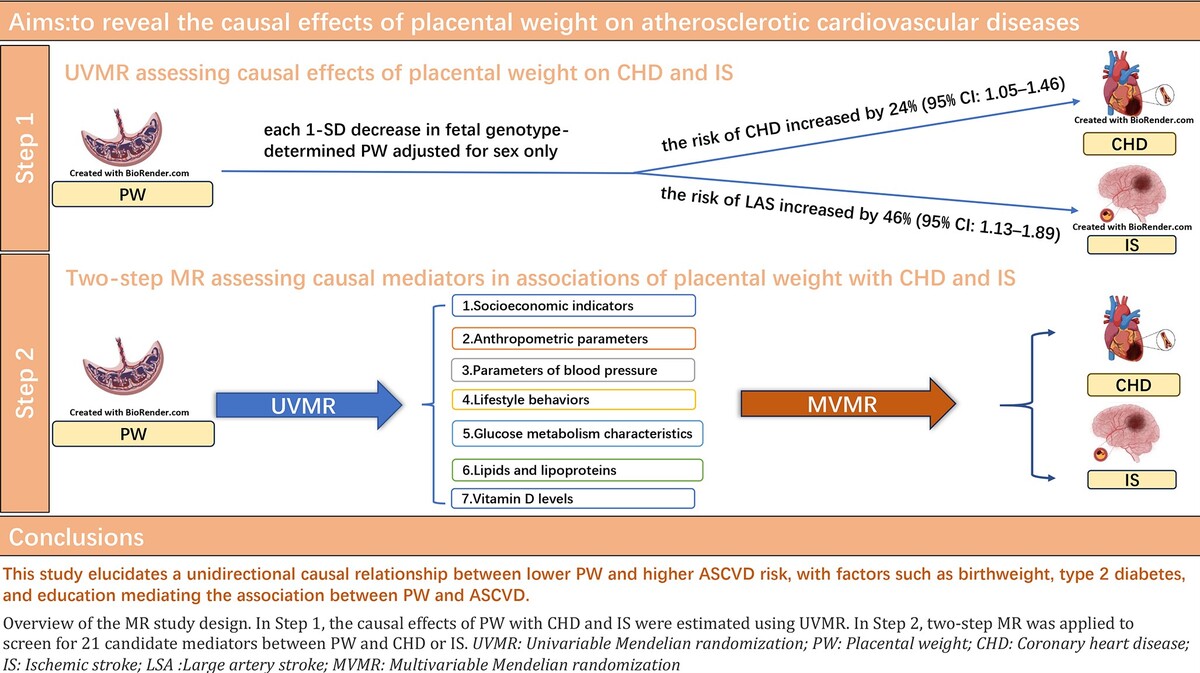Current issue
Archive
Manuscripts accepted
About the Journal
Editorial office
Editorial board
Section Editors
Abstracting and indexing
Subscription
Contact
Ethical standards and procedures
Most read articles
Instructions for authors
Article Processing Charge (APC)
Regulations of paying article processing charge (APC)
Editor's Choice
ATHEROSCLEROSIS / RESEARCH PAPER
The causal effects of placental weight on atherosclerotic cardiovascular disease: a Mendelian randomization and mediation analysis
1
Tianjin Medical University General Hospital, China
These authors had equal contribution to this work
Submission date: 2024-08-08
Final revision date: 2024-09-24
Acceptance date: 2024-10-08
Online publication date: 2024-10-26
KEYWORDS
Atherosclerotic cardiovascular diseasePlacental weightCoronary heart diseaseIschemic strokeMediation analysisMendelian randomization
TOPICS
ABSTRACT
Introduction:
Previous studies have linked placental weight (PW) to cardiovascular diseases, but the causality and potential mediators underlying this relationship are still unknown.
Material and methods:
We conducted Mendelian randomization (MR) analysis via summary statistics from genome-wide association studies (GWAS), including PW adjusted for sex, 21 candidate mediators and atherosclerotic cardiovascular disease (ASCVD), which includes coronary heart disease (CHD) and ischemic stroke (IS).Two-step MR was employed to identify and assess the mediation proportion of potential mediators in the association between PW and ASCVD. Additionally, we conducted a repeated analysis using PW adjusted for gestational age and sex.
Results:
Univariable MR (UVMR) analysis revealed that for each 1-SD decrease in fetal genotype-determined PW adjusted for sex only, the risk of CHD increased by 24% (95% CI: 1.05–1.46) and the risk of large artery stroke (LAS) increased by 46% (95% CI: 1.13–1.89). Similar results were obtained in repeated analyses. The mediation MR analysis revealed that the causal relationship between fetal genotype-determined PW and CHD risk was primarily mediated by birthweight, type 2 diabetes, and education, each mediating 3.66% to 40.80% of the total effect. The causal relationship between fetal genotype-determined PW and LAS risk was mediated mainly by type 2 diabetes, which accounted for 22.11% of the total effect.
Conclusions:
This study elucidated a unidirectional causal relationship between lower PW and a greater ASCVD risk, with factors such as birthweight, type 2 diabetes, and education mediating the association between PW and ASCVD.
Previous studies have linked placental weight (PW) to cardiovascular diseases, but the causality and potential mediators underlying this relationship are still unknown.
Material and methods:
We conducted Mendelian randomization (MR) analysis via summary statistics from genome-wide association studies (GWAS), including PW adjusted for sex, 21 candidate mediators and atherosclerotic cardiovascular disease (ASCVD), which includes coronary heart disease (CHD) and ischemic stroke (IS).Two-step MR was employed to identify and assess the mediation proportion of potential mediators in the association between PW and ASCVD. Additionally, we conducted a repeated analysis using PW adjusted for gestational age and sex.
Results:
Univariable MR (UVMR) analysis revealed that for each 1-SD decrease in fetal genotype-determined PW adjusted for sex only, the risk of CHD increased by 24% (95% CI: 1.05–1.46) and the risk of large artery stroke (LAS) increased by 46% (95% CI: 1.13–1.89). Similar results were obtained in repeated analyses. The mediation MR analysis revealed that the causal relationship between fetal genotype-determined PW and CHD risk was primarily mediated by birthweight, type 2 diabetes, and education, each mediating 3.66% to 40.80% of the total effect. The causal relationship between fetal genotype-determined PW and LAS risk was mediated mainly by type 2 diabetes, which accounted for 22.11% of the total effect.
Conclusions:
This study elucidated a unidirectional causal relationship between lower PW and a greater ASCVD risk, with factors such as birthweight, type 2 diabetes, and education mediating the association between PW and ASCVD.
Share
RELATED ARTICLE
We process personal data collected when visiting the website. The function of obtaining information about users and their behavior is carried out by voluntarily entered information in forms and saving cookies in end devices. Data, including cookies, are used to provide services, improve the user experience and to analyze the traffic in accordance with the Privacy policy. Data are also collected and processed by Google Analytics tool (more).
You can change cookies settings in your browser. Restricted use of cookies in the browser configuration may affect some functionalities of the website.
You can change cookies settings in your browser. Restricted use of cookies in the browser configuration may affect some functionalities of the website.



